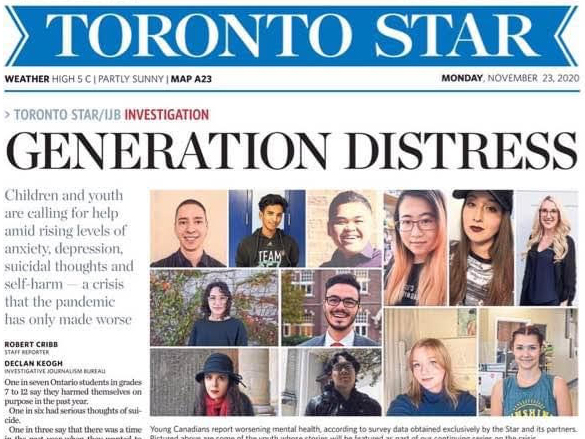
via Ryerson School of Journalism Newsletter
Students from the Ryerson School of Journalism’s investigative reporting class from the Winter 2020 semester have had some of the stories they were working on appear in the Toronto Star.
The package of stories, called Generation Distress, started appearing in the Toronto Star on Nov. 23. Generation Distress examines the current generation of young people making unprecedented calls for help amid rising mental health problems.
Rob Cribb, a sessional lecturer at the RSJ, was the Ryerson University faculty member, external link who helped to co-ordinate Generation Distress. Cribb said the investigative reporting course examined the youth mental health crisis because it is a large, systemic topic.
“I think it’s an emerging public health crisis that hasn’t received the kind of treatment in the media that it deserves,” said Cribb. “It’s an area I’ve been working on for a while.”
Giulia Fiaoni, a fourth-year journalism student at Ryerson, worked on Generation Distress as an intern with the Investigative Journalism Bureau. Fiaoni’s responsibilities consisted of conducting interviews, researching, writing, and photojournalism.
“This was my first time working on a long-term investigative project like Generation Distress, and I absolutely adored every bit of the process,” said Fiaoni. “It’s a challenging and exhausting form of journalism, but undoubtedly worthwhile.”
Fiaoni said her favourite part has been seeing the responses from readers impacted by the series in a positive way.
The first story from the package was called “The kids are in crisis.” It set the stage for a package investigating the spiking demand for youth mental health services, the pressure on educational institutions, and innovative solutions emerging to deal with this crisis. The series starts by examining data from the Canadian Association of Mental Health gathered from youth in Grade 7 to 12 and a scientific survey done by 6,000 post-secondary students across Canada and the United States.
The story headlined “It could be you” focused on Kyle Gardiner, a young adult who died by suicide earlier this year. People viewed Gardiner as successful, but he was suffering inside.
Subhangi Anandarajah, Mahad Arale, Cole Brocksom, Cassandra Dubiel, Menna Elnaka, Urbi Khan, Will Lofsky, Gavin Mercier, Abhi Raheja, Roxanne Stewart-Johnson, Kevin Taghabon, and Minh Truong, students at the RSJ, were the reporters involved with this package of stories. Cribb said it was a unique experience working with this reporting team, because they were the demographic being written about.
This investigation was done in collaboration with the Investigative Journalism Bureau, NBC News, the National Observer, and journalism faculty and students from other Canadian and American universities.
Declan Keogh, an RSJ class of 2019 grad, worked on Generation Distress as a senior reporter for the Investigative Journalism Bureau. Keogh said it was tough working on Generation Distress.
“It’s a pretty intense subject matter,” said Keogh. “There’s been days where it’s overwhelming for sure, but the goal of course is to inform the public and hopefully make a change and a difference in somebody’s life.”
He has felt happy about the kind words and encouragement he has received from people who have read the package.
Generation Distress involved more than 200 young people, academics, and clinicians being interviewed. More than 1,000 documents were examined. More than 100 studies were reviewed.
There were 152 young people interviewed who self-identified as having mental health challenges. These interviews found 90 per cent of these young people had anxiety.
Cribb hopes Generation Distress increases public awareness among older people about the youth mental health crisis. He wants the package to inspire smarter investments in mental health services.
He said more action has to be taken because young people are struggling.
“If we don’t, we’re going to lose a generation,” he said. “The numbers are too staggering to ignore.”